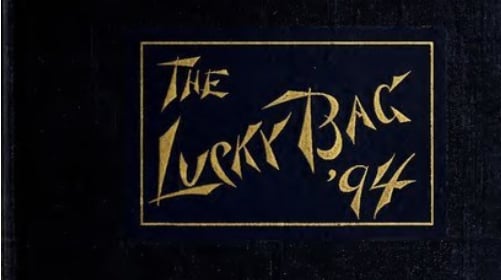Many of us know him for his quirky infomercials that took the 1992 presidential election by storm, talking in his down-home way about balancing the budget, creating jobs, or other timely economic concepts. Perot, one of USNA’s distinguished graduates, captured the imagination of Americans over the course of two unconventional presidential runs. He became one of the most successful third party candidates for American presidents in history, and when you look at his life, you can see why.
Born Henry Ross Perot on June 27, 1930 to a cotton broker, Gabriel Ross, and his wife, Lulu May, Perot started college at Texarkana Junior College and made the jump to the U.S. Naval Academy in 1949. He was elected class president twice during his time there. In 1953 he received his commission as a junior officer on the destroyer USS Sigourney. He then transferred to the aircraft carrier USS Leyte in 1955 and served until 1957. In 1956, he married Margot Birmingham, a Goucher College student whom he had met on a blind date at the Naval Academy his senior year.
Becoming a Billionaire
Then Perot entered the business world, which is where he made his name. He started as a salesman for International Business Machines Corporation (IBM), where he absorbed the successful business lessons he would later use for his own company. In 1962 he quit IBM, and started Electronic Data Systems Corp. (EDS); the company contracted with companies to design, install and operate computer data-processing systems. Ross Perot and his team forged a fortuitous relationship processing medical claims for Blue Cross as well as several other big insurance companies, which helped build EDS significantly. He was able to compound that success with a public sale in 1968 which yielded him as majority shareholder, several hundred million dollars. He was just 38.
Perot continued to lead the company until its sale to General Motors in 1984 for a whopping $2.5 billion—which included special-issue stock plus a seat on their board of directors. Per the buyout agreement, he relinquished this seat two short years later for $700 million. In 1988 he started technology services company Perot Systems Corp. with his son, Ross Junior, and other associates.
Although he was immersed in the world of business, Perot never forgot his friends in the Navy. In 1969, he tried to free friend and fellow USNA distinguished graduate Vice Admiral James B. Stockdale and several other American POWS from North Vietnam in 1969 but was unable to do so. In 1974 he received the Defense Department’s Medal for Distinguished Public Service for his efforts. Then in 1978, he worked to free two EDS employees that were held hostage in Iran, using a team of employee commandos from his employees and a hired former Green Beret colonel. This daring rescue became the subject for the best selling book On Wings of Eagles. In 1986, Britain’s Prince Charles and First Lady Nancy Reagan recognized Perot with the Winston Churchill Award, to honor those who best represent the British statesman’s spirit. He was the first businessman to receive the award.
Turning to Politics and the Infamous Infomercials
Then in 1992 Perot’s focus shifted, as he looked to apply his considerable business acumen to the political realm. The first time he ran for president in 1992, Perot took a rather unconventional path. As a guest on CNN’s Larry King Live in 1992, he told viewers he would throw his hat in the ring if they would file petitions to put him on the ballot in every state. The American people were drawn to his feisty, assertive demeanor that was softened by a self deprecating humor. A natural salesman with a tight crop and Texas drawl, he was known to make fun of his larger ears, and this endeared him to viewers.
At this moment in the campaign, Democratic lead Bill Clinton was laid low by scandals and current Republican president George H.W. Bush had lost favorability due to the state of the economy, so Perot found great support for his ideas. He campaigned as a non-traditional politician and reached across the aisle to woo Democrats too. Perot chose Admiral Stockdale as his vice presidential running mate since he deeply admired him, and the two waged an unconventional campaign.
Perot became famous for his infomercials, 30 minute commercials wherein he presented charts and graphs business style for the American people, rather than stumping across the country. At a point in the campaign just five months before the election, he led a Gallup Poll with 39 percent of the vote, versus 31 percent for Bush and 25 percent for Clinton.
Perot became known for eschewing the national debt and budget deficit, and providing ways to overcome them. He famously called the federal deficit “the crazy aunt in the basement” who no one wanted to talk about. He also railed against the North American Free Trade Agreement (NAFTA) that both Clinton and Bush supported. Perot sank over $65 million into his campaign, but was ultimately unsuccessful, despite his earlier lead. He did claim an impressive 19% of the popular vote, which was the best independent run since Teddy Roosevelt’s Bull Moose showing in 1912. This set him up for another try.
A Second Run
Perot set his sights on the presidency in the next cycle, establishing a nonpartisan political pressure group called United We Stand America. Then he started his own Reform party in September 1995 as a third party alternative to the two party system. This party supported a balanced federal government, campaign reform, congressional term limits, revamped healthcare and income tax systems as well as lobbying restrictions. He ran in 1996 with Pat Coate as his running mate, but garnered a disappointing eight percent of the vote this time. Clinton received 49 percent and Republican Bob Dole claimed 41 percent.
In the 2000 election, Perot did not run again. Rather, he endorsed Republican George W. Bush over the Reform Party nominee, Pat Buchanan, effectively leaving the Reform Party. Yet he didn’t completely leave politics. In 2008, his Perot Charts blog brought back his popular infomercials to talk fiscal policy in the technological platform du jour, much to the delight of his supporters.
Giving Back
Perot passed away at the age of 89 from leukemia in Dallas, Texas on July 9, 2019. He had amassed a net worth of approximately $4.1 billion according to an April 2019 Forbes article. Throughout his life, he was an ardent philanthropist, donating millions to the Museum of Nature and Science in Dallas, as well as to the fight against diabetes, in support of many UT Southwestern programs and hospitals, to the Boy Scouts of America, the Tejas Girl Scout Council and many other important causes.
"We’re all what we were taught to be," he once said. "You sit there in that little house in Texarkana and see your mother doing things like feeding the hungry when you’re a child. That’s the greatest lesson in the world…. When I came to Dallas, everything I owned was in the trunk of the car. I feel personally that I have always been rich in the things that count." He always focused on family. "I’ve had wonderful parents and I have a magnificent wife. I have great children. That’s real wealth."
Ross Perot will forever be remembered for shaking up the political establishment, and his philanthropic gifts will enrich the lives of others for many years to come. NABSD honors the life of Perot as well as our other Distinguished Graduates. We are continually inspired by their work and lives, and take great pride in supporting the midshipmen of today that will become tomorrow’s Distinguished Graduates.






